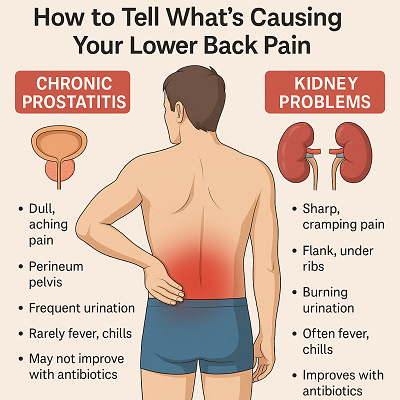Chronic Prostatitis vs. Kidney Problems: How to Tell What's Causing Your Lower Back Pain
Lower back pain is one of those symptoms that can mean many different things—and for men, two of the more common culprits are chronic prostatitis and kidney issues. But how do you know which one is to blame?
Both can cause similar types of discomfort in the lower back or flank area. Both can leave you feeling tired, irritable, and frustrated. But the underlying causes and treatments are very different. If you're trying to make sense of your symptoms, this guide is for you.
Let's walk through the key differences and what you should look out for.

First, What Does Chronic Prostatitis Feel Like?
Chronic prostatitis, or chronic pelvic pain syndrome (CPPS), is a long-term inflammation of the prostate. It's not always caused by infection—in fact, many cases are non-bacterial. But the symptoms can be persistent and nagging.
Typical signs include:
- Dull, aching pain in the perineum, lower back, or lower abdomen
- Pain or discomfort during or after urination
- Frequent urination or a feeling of incomplete emptying
- Pain during ejaculation or sexual activity
- A constant "heaviness" in the pelvic floor
The back pain associated with chronic prostatitis is usually described as a deep, non-radiating ache in the lower spine or sacrum. It's more of a muscular or internal discomfort rather than a sharp or shooting pain.
Now, What Does Kidney Pain Feel Like?
When the kidneys are involved—due to an infection, stones, or other issues—the pain is often more specific and intense. You’ll usually feel it just below the ribs, on one or both sides of your back.
Here's what sets kidney pain apart:
- Sharp, stabbing, or colicky pain that may come in waves (especially with kidney stones)
- Pain that radiates to the flank, groin, or lower abdomen
- Fever, chills, or nausea if an infection is present
- Cloudy, foul-smelling, or bloody urine
- Pain that worsens with movement or physical exertion
Kidney-related back pain is typically deeper and higher up than prostatitis-related discomfort. It may also be accompanied by signs of systemic illness, like fatigue or a low-grade fever.
Key Differences at a Glance
| Symptom | Chronic Prostatitis | Kidney Issues |
| Pain location | Lower back, perineum, pelvis | Flank area, under ribs, radiating to groin |
| Pain type | Dull, aching, constant | Sharp, cramping, may come in waves |
| Urinary symptoms | Frequent, urgent urination, weak stream | Burning urination, blood in urine, foul odor |
| Systemic symptoms | Rarely fever or chills | Often fever, chills, nausea |
| Trigger | Worse after sitting long, ejaculation | Worse with movement, dehydration |
| Response to antibiotics | May not improve much | Often improves if infection is present |
Why It's So Easy to Confuse the Two
The urinary tract and the prostate are closely connected, so it's no surprise their symptoms often overlap. And for men with a history of urinary problems or chronic pelvic pain, any back discomfort can feel like a flare-up of the same issue.
But treating prostatitis with kidney medications—or vice versa—can delay recovery. That’s why getting a proper diagnosis is critical.
A urinalysis, digital rectal exam (DRE), prostate fluid test, and ultrasound or CT scan can all help distinguish between the two. If you're experiencing ongoing pain and not sure where it's coming from, don't try to self-diagnose.
Natural Relief for Chronic Prostatitis
If tests rule out kidney involvement and you're left dealing with chronic prostatitis, don’t lose hope. While it can be stubborn, many men find lasting relief with a combination of lifestyle changes and natural therapies.
One such option is the Diuretic and Anti-inflammatory Pill, a Traditional Chinese Medicine (TCM) formula designed to:
- Clear heat and toxins
- Promote blood circulation
- Relieve pelvic congestion
- Support prostate healing
Because it targets the root imbalances causing chronic inflammation, it may offer a more complete and sustained solution—especially for men who have relapsed after antibiotics.
Learn more about how the Diuretic and Anti-inflammatory Pill helps chronic prostatitis here
When to See a Doctor Immediately
If you notice any of the following, seek medical attention right away:
- Fever or chills
- Nausea or vomiting
- Severe pain in the flank or groin
- Blood in your urine
- Sudden inability to urinate
These may indicate a kidney infection, kidney stone, or another urgent condition that needs prompt treatment.
Final Thoughts
While both chronic prostatitis and kidney issues can cause lower back pain, paying attention to pain location, quality, and associated symptoms can give you important clues. Don't ignore persistent discomfort—it's your body's way of signaling that something's off.
Whether it is your prostate, your kidneys, or something else entirely, the sooner you identify the source, the faster you can find relief. And if you are managing chronic prostatitis, consider combining conventional medicine with herbal support to tackle both the symptoms and their root causes.



